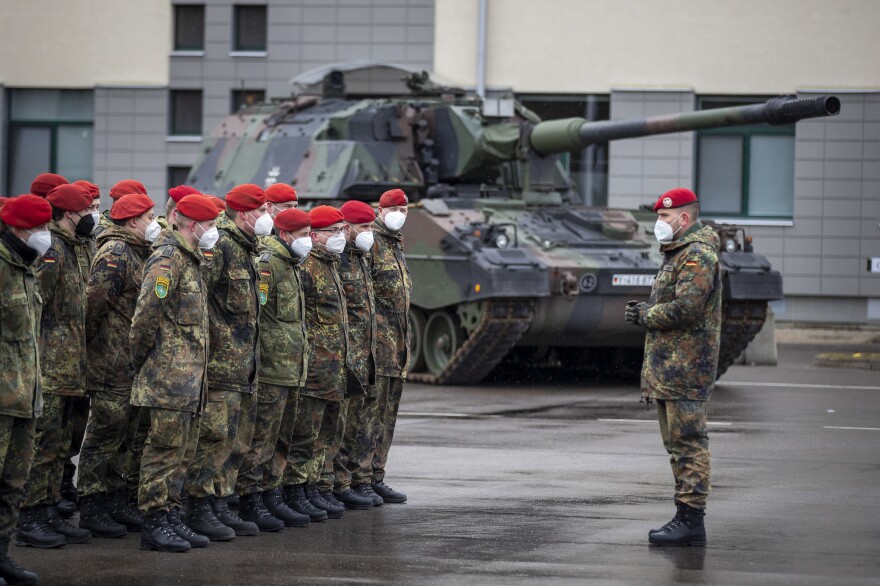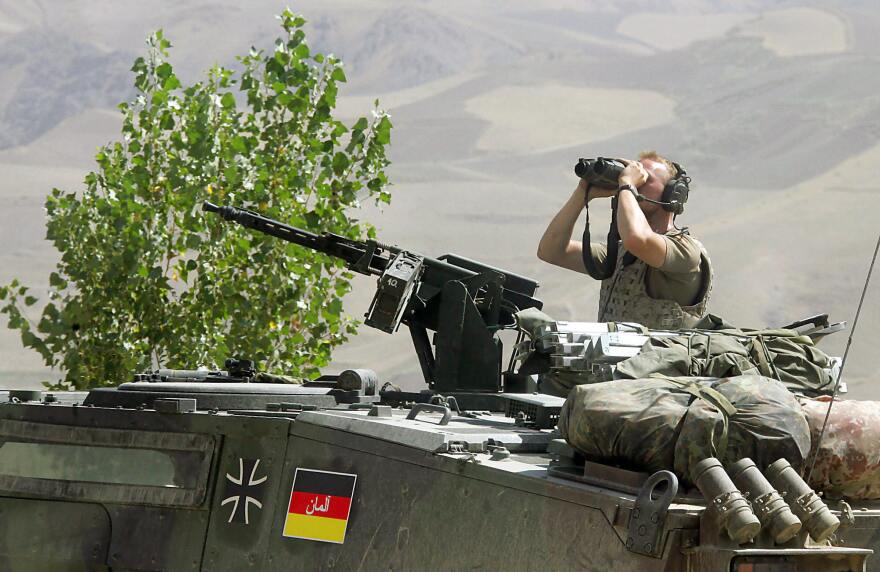German Republic Blocked Plans for Government to Continue War
BERLIN — The announcement came three days after Russia launched its invasion of Ukraine last month, and only few German lawmakers had been briefed on what Chancellor Olaf Scholz was about to say: that Germany would infuse its beleaguered military with 100 billion euros, putting it on pace to be Europe's strongest armed forces.
Scholz added that, from now on, Germany will invest more than 2% of its gross domestic product on its armed forces. According to data collected by NATO, Germany is expected to have spent 1.53% of GDP on defense last year.
Germany's parliament erupted into a rare standing ovation, a roar that filled the main chamber of the Reichstag, a building whose destruction and rebirth were at the center of the horrors of the last world war. It was now again witness to what Germans labeled a Zeitenwende: a historic turning point.
Defense expert Jana Puglierin watched on in disbelief. "It was mind-boggling for me to see this because for many of the things that he had basically decided overnight, I had fought [for] for years and I was sure to never see them materialize," she says.
Germany long resisted building a stronger army
Puglierin, who heads the Berlin office of the European Council on Foreign Relations, says for years she has listened to Germany's allies urge it to step up and spend more on defense and provide more leadership, while Germany's government has repeatedly dismissed the idea.

Mindaugas Kulbis / AP
/
AP
She says defense spending wasn't even an issue in the country's elections this past autumn. "And I think the main reason for it was because German citizens did not feel threatened for a very long time," she says. "They never saw that their security was actually a fragile thing. They took it very much for granted. And the sheer idea that, I don't know, a Russian missile would hit Germany was completely absurd."
This German mindset is rooted in a past that's difficult for many citizens to reckon with; a time when the country, under Adolf Hitler, built one of the world's largest armies. "They started the war, and obviously all industry was turned into the army. And then afterwards, everything was flattened," says military expert Constantin Wissman.
Wissman, author of "Not Quite Ready for Combat: How the German army became a rubbish army," says World War II not only destroyed the German military, but left a residue of shame around its future. "And actually, you can see a lot of problems which the German army has now stems from that time because we never really got comfortable with having an army."
Money can't buy everything
After the end of the Cold War, Germany slashed its defense budget and used its reduced military not so much to protect its homeland as to assist in NATO missions abroad, such as Kosovo and Afghanistan. The state of Germany's military suffered so much that, in 2015 during a joint-NATO training exercise, German troops were forced to use broomsticks painted black instead of guns because of equipment shortages.
Once the parliament passes Scholz's defense spending plan, the new funding will help, but money won't solve everything, Wissman says. "I think the structural deficits of the German army run deeper and they have the structural problems which should be resolved before you spend the money on it."
Even with the new money, military analyst Thomas Wiegold says Germany's armed forces will still be forced to play catch-up. "Funny enough, this does not mean increasing the size," says Wiegold. "This doesn't even mean to add completely different capabilities. First and foremost, it means to finance what actually should be there already."

Michael Hanschke / AFP via Getty Images
/
AFP via Getty Images
Things like modern fighter jets — earlier this month, Germany pledged to buy nearly three dozen F-35s from Lockheed Martin to replace its 40-year-old fleet of Tornado jets. Wiegold says that's just the start. Germany needs to buy new tanks, weapons and warships, among many other things.
Europe could feel safer and rely less on the U.S.
And as Germany rebuilds its military, Wiegold says the rest of Europe will feel safer. He quotes a former Polish foreign minister who said, "I'm not afraid of a strong German army. I'm afraid of a weak German army."
"It's not that France or the U.K. or Italy or even the Poles would see a militarily strong Germany as a threat," he says. "I think it's more or less the other way around; that they expect Germany, with its economic power, to do its part on the security side."
Defense expert Puglierin says she hopes Germany will move forward with the responsibility that Europe's largest military brings with it. Because for too long, she says, Germany has relied on the United States to help defend it. "I have heard so many Europeans and Germans saying 'Thank God we have the United States.' But at the same time, we need to realize that we should not take it for granted that the United States is there to babysit the Europeans forever," says Puglierin. "So I think we need to become a much more capable partner in the trans-Atlantic relationship to create a trans-Atlantic relationship on a level on equal footing."
And she says this means not only sharing the U.S. military's burden, but also having a fair say in how international security develops. She says Germany is not only wary of Russia, but also of China, and depending on who takes the White House in 2024, it's difficult to predict what Germany's relationship with the U.S. will be like. A stronger German military, she reasons, should help Germany navigate this uncertainty; a military that is now on track to be the world's third largest, behind only the American and Chinese militaries.
"What I would hope to see is that we develop a healthy relationship towards this notion of European sovereignty because I think it's definitely necessary," she says.
Puglierin says, for decades, Germany's leadership believed it could bring peace through trade and wouldn't need a big military. But the world has become more unstable and unpredictable. And a capable military, she says, is now a necessity.
Esme Nicholson contributed to this report from Berlin.
Copyright 2022 NPR. To see more, visit https://www.npr.org.
Source: https://www.wunc.org/2022-03-22/with-war-on-its-doorstep-germany-plans-a-major-military-buildup
0 Response to "German Republic Blocked Plans for Government to Continue War"
Post a Comment